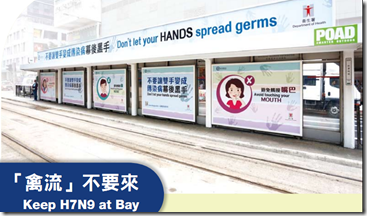
H7N9 Awareness Campaign Summer 2013 - Photo credit Hong Kong’s CHP
# 8385
Yesterday, in HK CHP Investigating Imported H7N9 Case, we learned of the arrival in that city of a 5-month-old girl from neighboring Guangdong Province, who was infected with the H7N9 avian flu virus.
Today, we’ve an update from Hong Kong’s Centre for Health Protection that focuses on aggressive patient contact surveillance (all asymptomatic and/or negative for Influenza A so far), and reminders to the public on appropriate precautions to avoid infection.
To date, Hong Kong has identified 7 imported cases of the H7N9 virus, but none that have been acquired locally.
The Centre for Health Protection (CHP) of the Department of Health (DH) today (March 18) provided an update on the seventh confirmed human case of avian influenza A(H7N9), which is affecting a 5-month-old girl.
"The epidemiological investigations, enhanced disease surveillance, port health measures and health education against avian influenza are all ongoing," a spokesman for the DH said.
As of 4pm today, five close contacts and 44 other contacts have been identified.
The close contacts included the patient's parents and two patients and a visitor who had stayed in the same cubicle with the index patient in Alice Ho Miu Ling Nethersole Hospital. All of them have remained asymptomatic so far and their respiratory specimens all tested negative for Influenza A virus. They are now under quarantine.
Other contacts included relevant healthcare workers, ambulance staff, visitors of patients and staff at Lo Wu Control Point. All of them have remained asymptomatic so far. They are all under medical surveillance.
"In view of human cases of avian influenza A(H7N9) confirmed locally and multiple cases notified by the Mainland, further cases are expected in affected and possibly neighbouring areas. Those planning to travel outside Hong Kong should maintain good personal, environmental and food hygiene at all times," the spokesman said.
"All boundary control points have implemented disease prevention and control measures. Thermal imaging systems are in place for body temperature checks on inbound travellers. Random temperature checks by handheld devices have also been arranged. Suspected cases will be immediately referred to public hospitals for follow-up investigation," the spokesman added.
Health education for travellers, the display of posters in departure and arrival halls, in-flight public announcements, environmental health inspection and provision of regular updates to the travel industry via meetings and correspondence are all proceeding.
The spokesman advised travellers, especially those returning from avian influenza-affected areas and provinces with fever or respiratory symptoms, to immediately wear masks, seek medical attention and reveal their travel history to a doctor. Health-care professionals should pay special attention to patients who might have had contact with poultry, birds or their droppings in affected areas and provinces.
"We have enhanced publicity and health education to reinforce health advice on the prevention of avian influenza," the spokesman said.